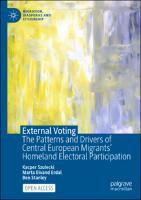External Voting
The Patterns and Drivers of Central European Migrants' Homeland Electoral Participation
| dc.contributor.author | Szulecki, Kacper | |
| dc.contributor.author | Erdal, Marta Bivand | |
| dc.contributor.author | Stanley, Ben | |
| dc.date.accessioned | 2023-01-20T16:54:58Z | |
| dc.date.available | 2023-01-20T16:54:58Z | |
| dc.date.issued | 2023 | |
| dc.identifier | ONIX_20230120_9783031192463_49 | |
| dc.identifier.uri | https://library.oapen.org/handle/20.500.12657/60854 | |
| dc.description.abstract | This open access book is the first monograph that brings together insights from comparative politics, political sociology, and migration studies to introduce the current state of knowledge on external voting and transnational politics. Drawing on new data gathered within the DIASPOlitic project, which created a comparative dataset of external voting results for 6 countries of origin and 17 countries of residence as well as an extensive qualitative dataset of 80 in-depth interviews with four groups of migrants, this book not only illustrates theoretical problems with empirical material, but also provides answers to previously unaddressed questions. The empirical material focuses on the European context. The Eastern Enlargement of the European Union (2004-2007) triggered a westward wave of migration from Central and Eastern European countries which faced the expansion of existing émigré communities and the emergence of new ones. As this process coincided with the expansion of migrant voting rights, the result is a large set of populous diaspora communities which can potentially have a significant impact on country electoral politics, making the study of external voting highly relevant. This book’s introduction takes stock of current research on transnational politics and external voting, presenting core puzzles. The following chapter introduces the context of intra-European migration and the political situation in Central-Eastern European sending countries. The next two sections address the empirical puzzles, drawing on new quantitative and qualitative. The conclusion takes stock of the evidence gathered, discusses the normative problem of non-resident voters enfranchisement, connects external voting to the broader debate on political remittances and finally, maps the terrain ahead for future research. This concise, empirically grounded introduction to external voting is critical reading in structuring the debate around migration and shaping research agendas for the future. | |
| dc.language | English | |
| dc.relation.ispartofseries | Migration, Diasporas and Citizenship | |
| dc.subject.classification | thema EDItEUR::J Society and Social Sciences::JB Society and culture: general::JBF Social and ethical issues::JBFH Migration, immigration and emigration | en_US |
| dc.subject.classification | thema EDItEUR::5 Interest qualifiers::5P Relating to specific groups and cultures or social and cultural interests::5PB Relating to peoples: ethnic groups, indigenous peoples, cultures and other groupings of people::5PBC Relating to migrant groups / diaspora communities or peoples | en_US |
| dc.subject.classification | thema EDItEUR::J Society and Social Sciences::JH Sociology and anthropology::JHB Sociology | en_US |
| dc.subject.classification | thema EDItEUR::J Society and Social Sciences::JP Politics and government::JPH Political structure and processes::JPHF Elections and referenda / suffrage | en_US |
| dc.subject.other | External Voting | |
| dc.subject.other | Electoral Behavior | |
| dc.subject.other | Migration | |
| dc.subject.other | Diasporas | |
| dc.subject.other | Transnational Politics | |
| dc.subject.other | Central Europe | |
| dc.title | External Voting | |
| dc.title.alternative | The Patterns and Drivers of Central European Migrants' Homeland Electoral Participation | |
| dc.type | book | |
| oapen.identifier.doi | 10.1007/978-3-031-19246-3 | |
| oapen.relation.isPublishedBy | 6c6992af-b843-4f46-859c-f6e9998e40d5 | |
| oapen.relation.isFundedBy | 4faa9cf2-722d-4673-8c9d-e3209d05f24f | |
| oapen.relation.isbn | 9783031192463 | |
| oapen.imprint | Palgrave Macmillan | |
| oapen.pages | 116 | |
| oapen.place.publication | Cham | |
| oapen.grant.number | [...] |

